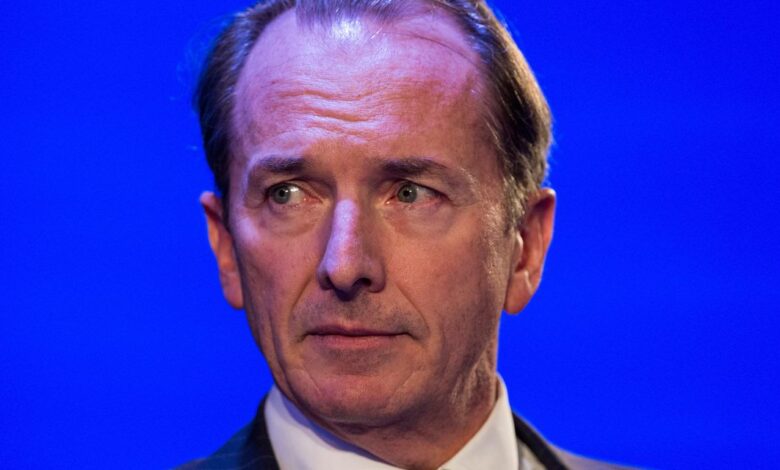
[ad_1]
Succession issues that have swirled around some of the largest U.S. banks have heightened in regard to Morgan Stanley and weighed on its stock in the week since the marquee bank provided no updates on who its next leader will be after Chief Executive James Gorman retires.
Morgan Stanley shares
MS,
managed to rise 0.3% Tuesday with tailwinds from the broad market for the bank’s first move into the positive column since its mixed third-quarter earnings update last week. The stock is still down 8.6% in the past week. It has fallen nearly 14% in the past month, compared with a 7.8% drop by rival Goldman Sachs Group Inc.
GS,
and a 3.1% loss by JPMorgan Chase & Co.
JPM,
during the same time period.
Morgan Stanley is in the midst of a leadership transition, with Gorman planning to step down by May. Three potential successors at the bank include Andy Saperstein, who heads up wealth management; Ted Pick, who runs capital markets; and Dan Simkowitz, head of investment management.
Asked by analysts how the search is going, Gorman said, “We’re getting close,” but he provided no further details.
“We’re well into it, and I do believe there are diminishing returns at some point in time,” Gorman said. “We’re not there. The team is doing great. The businesses are moving forward. But yeah. I want to get out of the seat and give somebody else a chance to see what they can do with it, and I think there’s a lot of things, the growth opportunities in this company.”
A Morgan Stanley spokesperson declined to comment.
Brian Mulberry, vice president and client portfolio manager at Zacks Investment Management, said the lack of a successor at Morgan Stanley has weighed on its stock price of late.
“Not having defined leadership makes it difficult to see what direction they want to go in,” Mulberry told MarketWatch. “They may not be able to take part in consolidation among registered investment advisers. The bank may be in good shape now, but opportunities to grow the business may go wanting.”
Christopher Marinac, a bank analyst at Janney, said there’s no guarantee that Saperstein, Pick or Simkowitz will get the job. A lack of a successor has fed some volatility around the stock, he said.
“Anything is possible at Morgan Stanley,” he said. “It comes down to who is influential inside the company. My sense is to always expect the unexpected. There may be people the board likes that are unknown to Wall Street.”
Odeon Capital analyst Richard Bove cited a lack of clear leadership at Morgan Stanley in his downgrade of the stock to neutral from buy on Monday.
“Until this firm clearly defines its leadership and purpose, it is likely to float with little direction,” Bove said.
Bove said Gorman’s claim that the board wants him to stay until it finds a successor and then to remain as executive chair makes no sense.
“It places the firm in turmoil and it sets up a competition that leads to major infighting and lower operating results,” Bove said. “It sets the firm adrift and
harms its position in the financial markets.”
In an email to MarketWatch, Bove said it’s possible that the leadership transition at Morgan Stanley may have sparked some infighting at the bank.
When Walter Wriston decided to retire from Citicorp, the predecessor of Citigroup Inc.
C,
two years before he exited the job in 1984, it unleashed internal rivalries among three potential successors, Bove said.
After John Reed won out at Citi, there was a “blood bath” within the bank among the people who had backed the other two candidates.
Such situations are “destructive, unproductive and wrong,” Bove said.
Succession issues have been in the background for at least four of the six major banks. PMorgan Chase Chief Executive Jamie Dimon has been in the job since 2005, and Bank of America Corp.
BAC,
Chief Executive Brian Moynihan has been at the helm since 2010.
Moynihan, 64, and Dimon, 67, have reached the age when many people retire, but there has not been any concrete talk of a successor at either bank.
Dimon is in line to receive a $50 million bonus that was disclosed as part of his 2021 pay package and that requires him to stay on the job until 2026. The bonus is in the form of stock awards that won’t be available for sale until 2031.
Federal banking regulators require major banks to have replacements lined up for chief executives, but financial firms are not required to make their internal personnel plans public.
Citigroup Chief Executive Jane Fraser has only been in the job since March 2021, and Charles Scharf has been chief executive at Wells Fargo & Co.
WFC,
for four years. Both Fraser and Scharf are in the midst of overhauling their respective banks, and there has not been much talk of replacing them at the moment.
Goldman Sachs Chief Executive David Solomon has been subject to internal criticism at the bank for its money-losing foray into consumer banking, but talk of his exit has quieted down of late.
Source link




